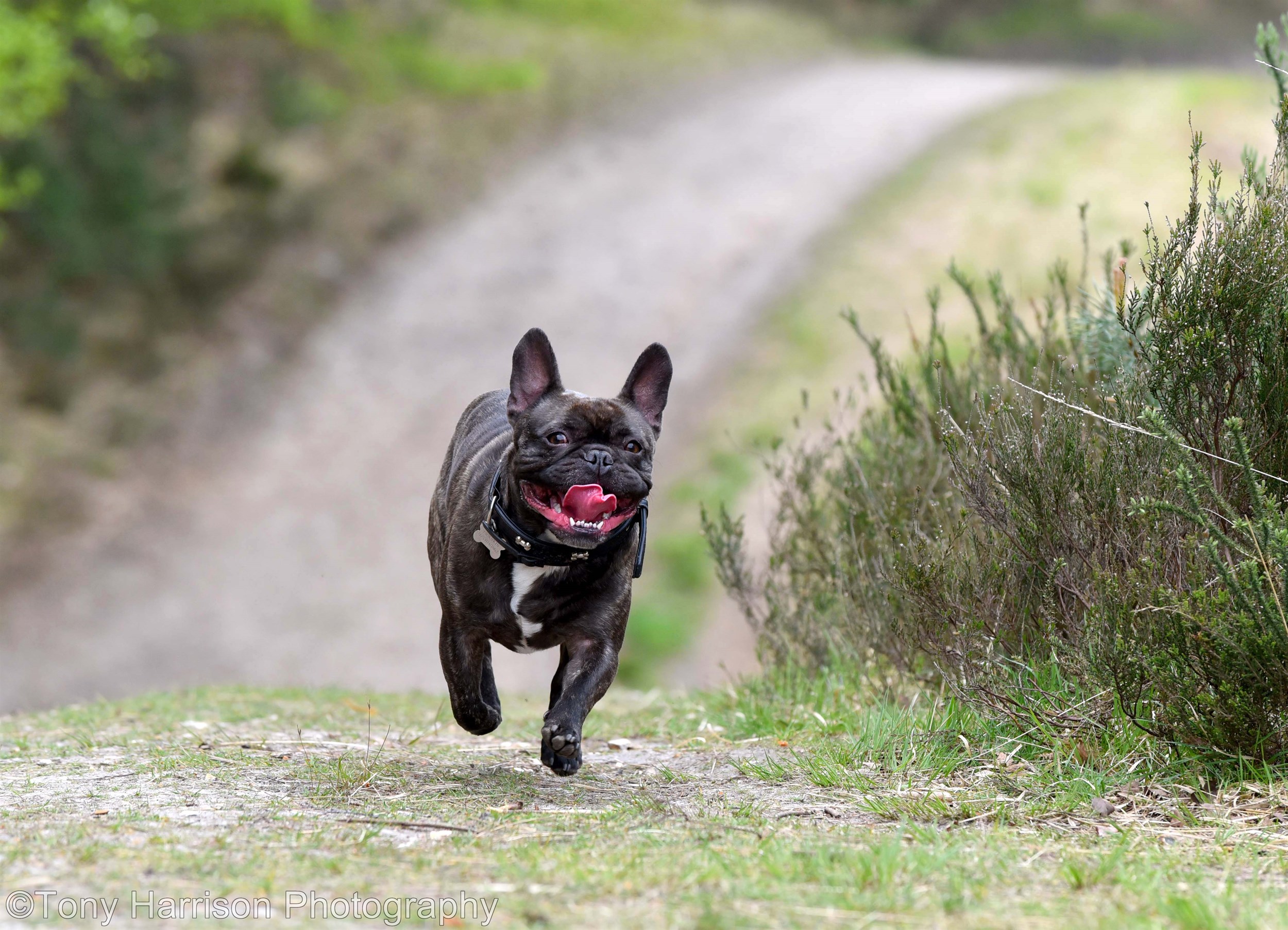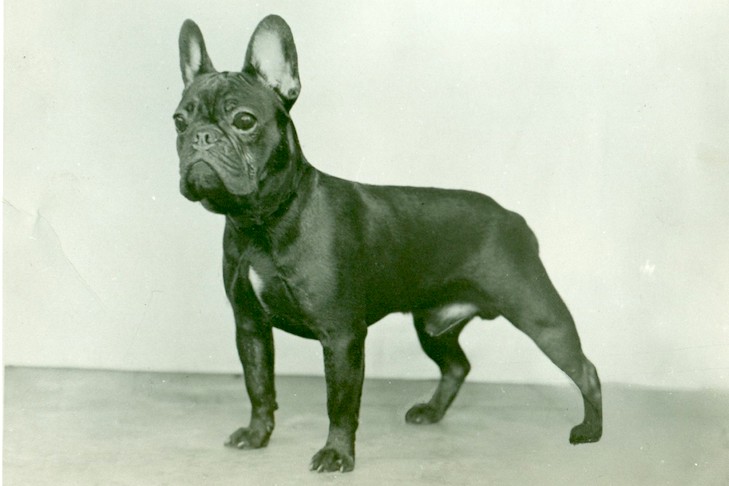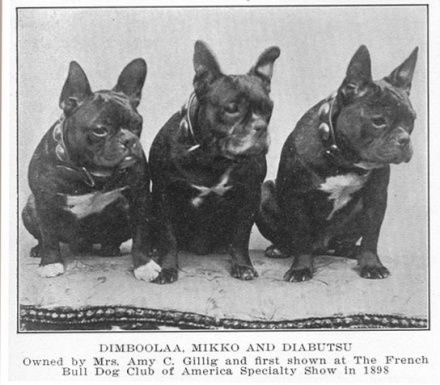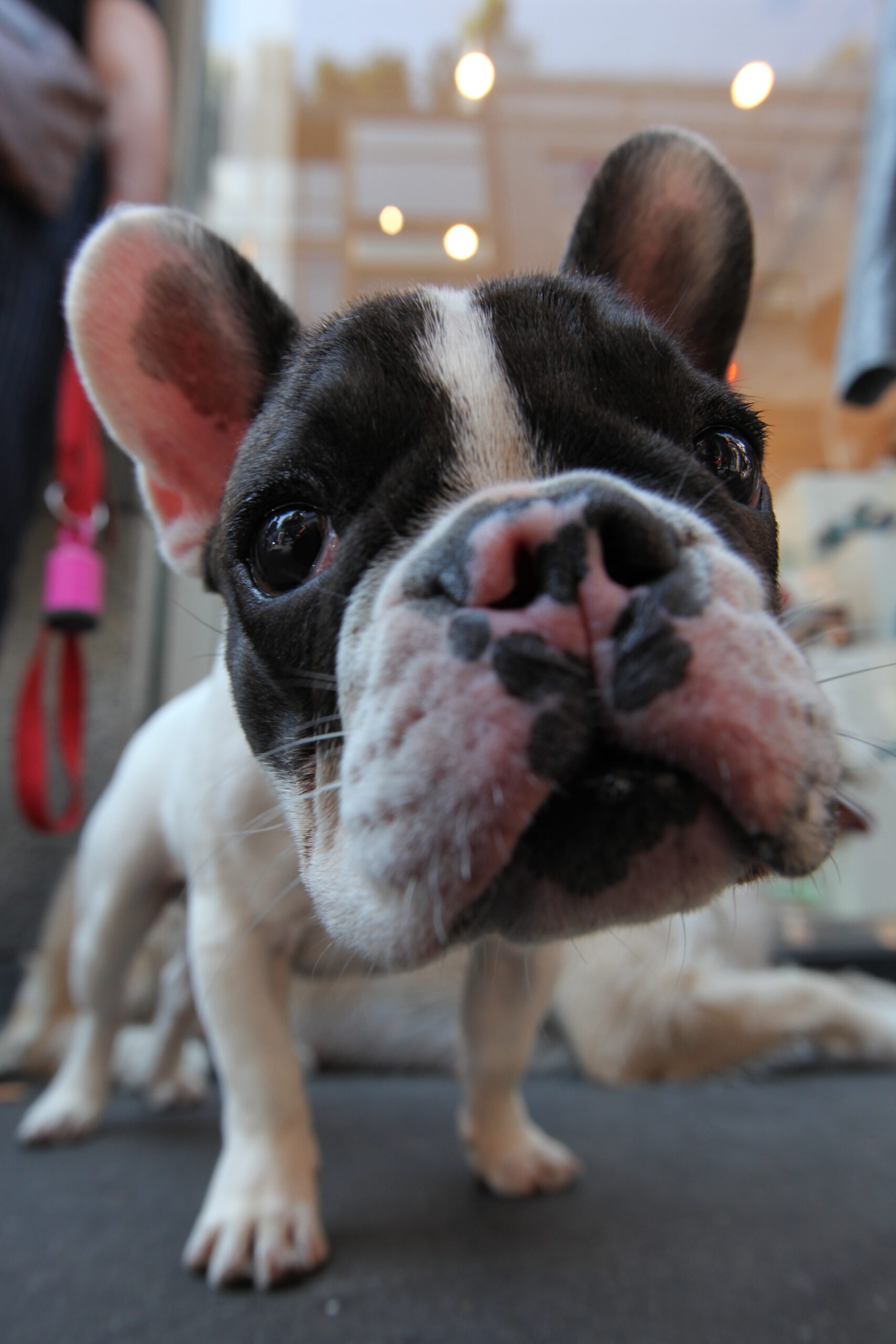Breed Age: Recognized by the AKC in 1898
Average Height: 11-13” for males and females
Average Weight: Less than 28lbs for males and females
Life Expectancy: 10-12 years
Coat Variations: Brindle, Brindle & White, Cream, Fawn, Fawn & White, Fawn Brindle & White, White, White & Brindle, White & Fawn
*All breed information comes from the AKC website on French Bulldogs
French Bulldog Breed History
The history of the French Bulldog begins with the banning of bull-baiting in England in the 1830s. English Bulldogs were retired as fighting animals, and were divided up by size when participating in dog shows. This event gave us the classification for English Toy Bulldogs.
When the Industrial Revolution started to claim the cottage industries in England in the early 1810s, lace workers began to relocate to find work. They found a home in northern France in Normandy and brought the small Bulldogs with them. There they became hugely popular with people of all levels of society.
Fast forward to 1890s Paris. Sex workers in places like Paris’ Montmartre neighborhood kept French Bulldogs as companions, both because of their personality and because their odd appearances made convenient ice breakers for their clients. The dogs became deeply associated with the working women of Paris, and would even be featured with the scantily-clad women on postcards in the early 1900s.
American tourists would fall in love with the French Bulldogs and brought them back to America soon after. A French Bulldog was even on the Titanic when it tragically sank. Today, the French Bulldog is one of the top 5 most popular dog breeds in America!
French Bulldog Strengths
- Playful
- Adaptable
- Little exercise required to stay healthy
- Minimal shedding
- Small and easy to travel with
- Don’t bark very much, but the love to “talk”
- Curious and alert
French Bulldog Weaknesses
- Can be stubborn
- Will need early socialization to get used to people/other animals
- Very sensitive to weather
- Can’t swim, and they should not be left alone by water
- As with English Bulldogs, Frenchies are prone to more health issues than most other breeds
8 Common French Bulldog Health Concerns:
Hip Dysplasia
Hip dysplasia is a common skeletal deformation, usually started by a dog’s genetics and exacerbated by weight, exercise, and nutrition. Hip dysplasia occurs when a dog’s hip joint, normally a ball and socket mechanism, does not develop properly. This causes the grinding of the bones in the joint, and can lead to total loss of function of the dog’s leg. Foods that help temper excessive growth can be helpful for puppies of breeds most at risk for hip dysplasia. Maintaining a healthy weight throughout the dog’s life is also crucial, as extra weight only adds more pressure to the at-risk joints. A veterinarian can also recommend joint supplements as part of a preventative treatment plan.
Collapsed Trachea
This is common amongst small dog breeds. It is a progressive condition, so catching it early is essential. Experts generally recommend using a harness for walking rather than a collar to avoid any excess strain on the tracheal rings that support the windpipe.
Cherry Eye
Bulldogology defines Cherry Eye in Bulldogs (French and English) as “a protrusion of the dog’s third eyelid, which happens due to stretching, detachment, or other problems in the tissue.” There are a number of causes for Cherry Eye, and your vet should be consulted immediately if you believe your French Bulldog is exhibiting symptoms.
Cataracts
Most commonly caused by inherited disease, though they can be caused by diabetes and can even occur spontaneously with age. Cataracts usually present much later in a dog’s life. Sometimes they can be removed surgically, but most dogs will retain reasonable sight even with cataracts.
Progressive Renal Atrophy
A genetic disorder characterized by progressive vision loss and eventual blindness in dogs. Currently, the only way to diagnose this disease is to have a specialist veterinary ophthalmologist examine the back of the dog’s eye to test retinal functionality. There are also a few genetic tests that can be administered to young dogs to test for the gene responsible for PRA.
Allergies
French Bulldogs may experience allergic reactions to many environmental and food-related factors. Working with your vet to identify your dog’s specific allergic triggers will help with management. Changes in skin texture and increased itching are some indicators that a Boxer may be having an allergic reaction.
Respiratory Conditions
According to a peer reviewed article from Today’s Veterinary Practice, Brachycephalic obstructive airway syndrome (BOAS) is present in all Bulldogs in some capacity. BOAS is an upper airway disease that is caused by the collapse of weaker tissue in the airway, and is exacerbated by heat or heavy exercise. Bulldogs are particularly susceptible to respiratory conditions due to their shortened snout. They should not over-exert themselves as this can lead to respiratory failure. This also means that water activities can be deadly to French Bulldogs, and they should never be left alone near any water source.
Hypoglycemia
Hypoglycemia refers to a condition that results in rapid drops in blood sugar levels. It is typical with small breeds, and usually with younger puppies. Symptoms can include dizziness, trouble walking, weakness, and confusion. Vets usually recommend feeding smaller meals more frequently throughout the day, rather than 1-2 larger meals to avoid the development or progression of hypoglycemia.
Sensitive
French Bulldogs are extremely sensitive to both heat and cold. They should not be left outside for long periods of time in any season.
If you have any questions or concerns about your pup’s health, please contact us as soon as possible to address them!






